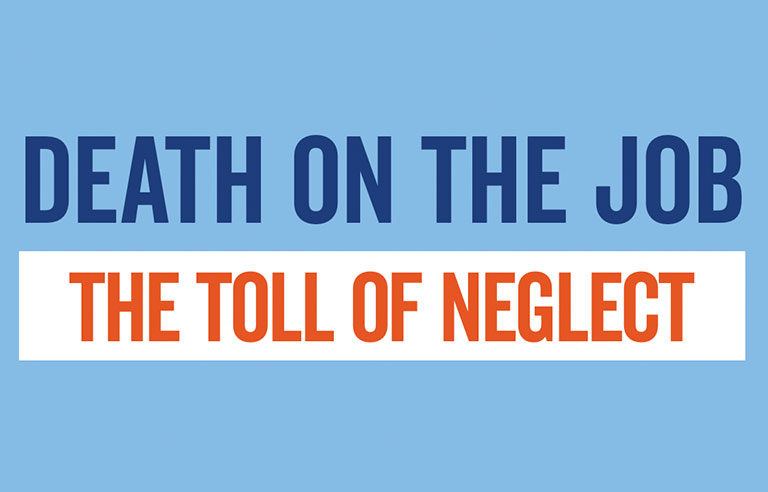Annual ‘Death on the Job’ report part of Workers’ Memorial Week

Washington — “The nation must renew its commitment to protecting workers from job injury, disease and death, and make this a high priority,” the AFL-CIO says in its annual report on the state of safety and health protections for U.S. workers.
Death on the Job: The Toll of Neglect is published annually during the week of Workers’ Memorial Day – observed on April 28 to honor people who have lost their lives on the job. It highlights state and federal data on work-related deaths, injuries and illnesses, as well on worker protections.
In 2020, the number of workplace deaths decreased to 4,764 from 5,333 in the previous year, while the national fatality rate dropped to 3.4 per 100,000 workers from 3.5, the report states. However, AFL-CIO points out that the total excludes the “many thousands who died from being exposed to COVID-19 at work,” in part because “employer reporting of COVID-19 cases still is mandatory only in a few states with specific standards or orders.”
Also from the report:
- Workplace violence accounted for 705 deaths, including 392 homicides, and was the fourth leading cause of workplace deaths behind transportation incidents (1,778 deaths); slips, trips and falls (805); and contact with objects or equipment (716).
- Black and Latino workers were at greater risk of dying on the job. The fatality rate for Blacks (3.5 per 100,000 workers) and Latinos (4.5) remains higher than the national average, with the rate for Latino workers climbing 15% over the past decade.
- A third of the deaths involved workers 55 and older, while those 65 and older had a fatality rate of 8.6 per 100,000 workers.
- The agriculture, forestry, and fishing and hunting industry had the highest fatality rate, at 21.5 per 100,000 workers. Transportation and warehousing (13.4) and mining, quarrying, and oil and gas extraction (10.5) followed.
“Employers must meet their responsibilities to protect workers and be held accountable if they put workers in danger. Only then can the promise of safe jobs for all of America’s workers be fulfilled,” the AFL-CIO said. “There is much more work to be done to ensure the fundamental right to a safe job is a reality for all.”
In a press release recognizing Workers’ Memorial Day, Labor Secretary Mary Walsh said that although each workplace death is tragic, lives “taken in incidents that might have been prevented – had their employers followed required safety and health standards – are especially painful.”
He continued: “While we have made much progress toward safer workplaces, we must do more to ensure that employers understand and take responsibility for addressing workplace hazards and keep them from causing workplace fatalities. As our economy continues its recovery, we are determined to empower workers as well so they can recognize the hazards around them, and demand their rights to a safe workplace without fear of retaliation.”
Other prominent voices from the occupational safety and health community offered their views on Workers’ Memorial Day.
| Sign up for Safety+Health's free monthly email newsletters and get the news that's important to you. |
“As we commemorate Worker’s Memorial Day, we remember that behind every fatality number is a worker,” NIOSH Director John Howard writes in an agency blog post. “Someone who has family, friends, community and a life. NIOSH remains committed to protecting workers across occupations and industries, addressing threats to workers’ safety, health and well-being, and collaborating with partners to address emerging and long-standing risks.”
Chris Cain, executive director of CPWR – The Center for Construction Research and Training, said in a press release that the observance “offers people and organizations two important opportunities: to remember those who have died and to strengthen their commitment to make sure every worker comes home safely every day.”
Cain added: “Remember that workers alone cannot create safe jobsites – it also takes the dedication of owners, contractors, managers, government officials and many others.”
Post a comment to this article
Safety+Health welcomes comments that promote respectful dialogue. Please stay on topic. Comments that contain personal attacks, profanity or abusive language – or those aggressively promoting products or services – will be removed. We reserve the right to determine which comments violate our comment policy. (Anonymous comments are welcome; merely skip the “name” field in the comment box. An email address is required but will not be included with your comment.)

